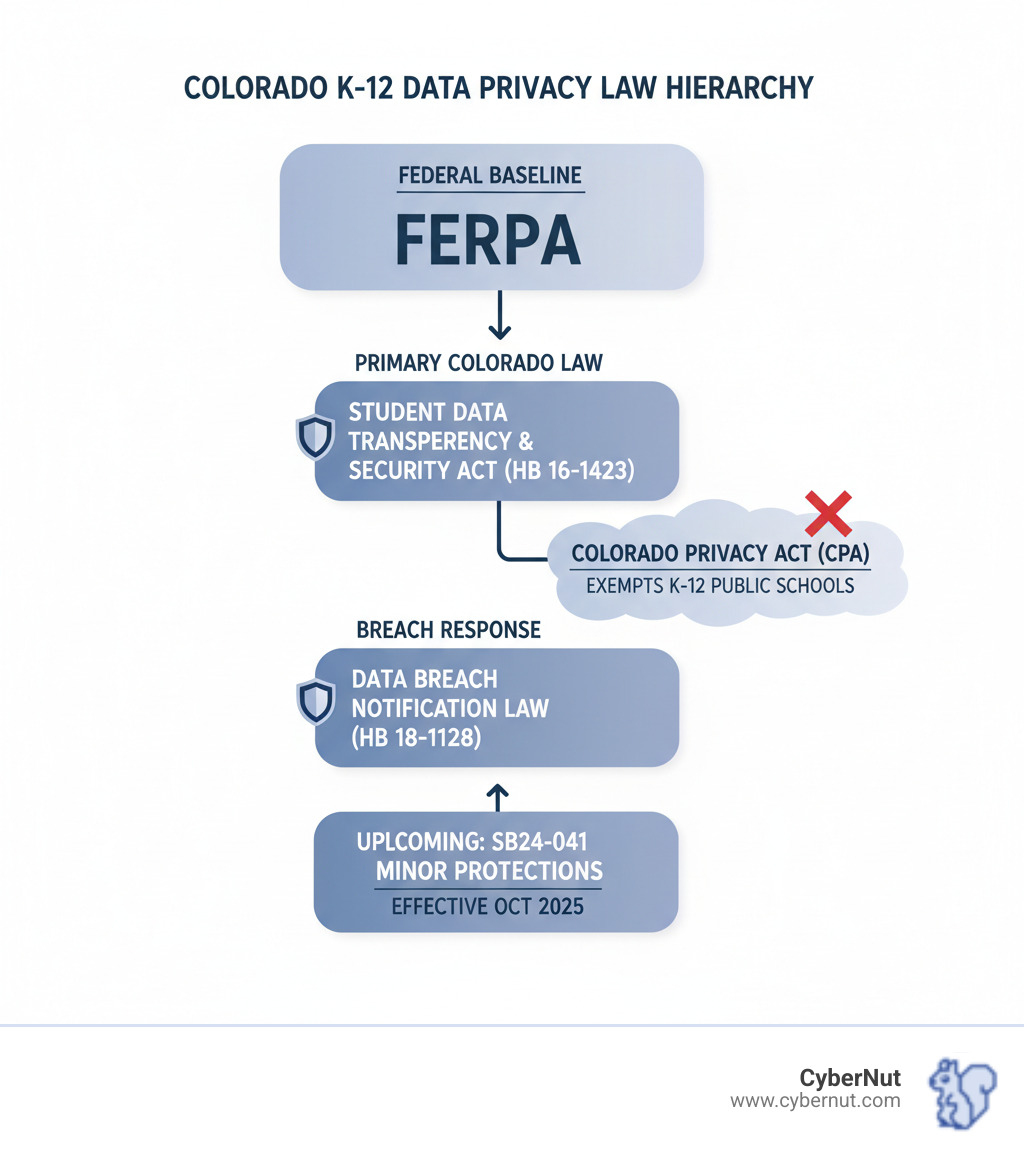
What to Know About
the Colorado Privacy Act for K–12 Schools
November 6, 2025

What to Know About the Colorado Privacy Act for K–12 Schools starts with a critical distinction: while the Colorado Privacy Act (CPA) is a major law for businesses, K-12 public schools are generally exempt from it. However, this exemption does not mean school districts can ignore data privacy compliance.
As one IT director put it: "Although Privacy precautions aren't likely in the forefront of our churning consciousness, as we rush to integrate a profusion of Safeguards, privacy still commands a presence."
The landscape of student data privacy in Colorado is a complex mix of federal and state laws. You must steer FERPA, the state-specific HB 16-1423, and new protections for minors' data coming in 2025. Each law has unique definitions and requirements.
Your school must:
These requirements build on what you should already be doing under FERPA. The challenge lies in understanding how Colorado's laws add layers of transparency, vendor accountability, and parent rights that go beyond federal minimums.
To assess your school's vulnerability to common threats like phishing, consider a Phishing Audit for your district.

Similar topics to What to Know About the Colorado Privacy Act for K–12 Schools:
Navigating data privacy laws can be overwhelming. For IT and data security leaders in Colorado K-12 schools, the key is knowing which laws apply to you—and which ones you can safely set aside.

The Colorado Privacy Act (CPA), or SB21-190, took effect on July 1, 2023. It's a comprehensive law giving Colorado residents rights over their personal data, including access, deletion, and opt-out of sale. It generally applies to businesses that process data for at least 100,000 consumers or process data for 25,000 consumers while earning revenue from data sales.
Here’s the crucial point for your school: public K-12 schools are explicitly exempt from the CPA. The law includes specific carve-outs for government agencies and educational institutions. While you don't have to comply with the CPA directly, its existence signals a statewide shift toward stronger data privacy that affects all sectors, including education. For more on the CPA's general framework, the Colorado Attorney General's office provides an overview of the Colorado Privacy Act.
If the CPA doesn't apply, what does? The primary law for Colorado schools is the Student Data Transparency and Security Act (HB 16-1423), in effect since 2016. This law was designed specifically for K-12 education.
Its purpose is to increase transparency and security around Student Personally Identifiable Information (Student PII). It applies to Local Education Providers (school districts, charter schools, BOCES) and the "School Service Contract Providers" they hire. A "School Service" is essentially any online tool used at the direction of the school that handles student data.
The definition of Student PII is intentionally broad, covering any information that, alone or combined, can identify a student or their family. This includes data collected by the school, generated by its systems, or even inferred by service providers. This goes beyond names and IDs to include behavioral data, assessment results, and more. The Colorado Department of Education offers data privacy and security guidance to help schools meet these obligations.
Understanding what to know about the Colorado Privacy Act for K–12 schools means seeing it as part of a larger privacy framework. The foundation of student data privacy remains the federal Family Educational Rights and Privacy Act (FERPA). Enacted in 1974, FERPA protects student education records and gives parents rights to inspect, correct, and control access to them. We cover this law in our article on FERPA: The Federal Student Privacy Law That Still Matters in 2025.
Colorado's laws build on FERPA's foundation. HB 16-1423 adds more specific requirements, and its definition of Student PII is often broader than FERPA's, closing potential gaps.
Another key law is Colorado's Data Breach Notification Law (HB 18-1128). This requires all organizations, including schools, to notify individuals and authorities when a data breach occurs. Knowing your notification duties is essential for incident response.
Together, these laws create a layered system: FERPA is the federal baseline, HB 16-1423 adds Colorado-specific rules for transparency and vendor management, and the Data Breach Notification Law dictates breach response. The CPA, while not directly applicable, reinforces the state's serious stance on privacy. To see if your district is prepared for threats that could lead to a breach, consider a phishing audit.
Compliance with Colorado's privacy laws, especially the Student Data Transparency and Security Act (HB 16-1423), translates into several key obligations. These are foundational to building trust with your community and keeping student data safe.

Strong data privacy begins with solid governance. HB 16-1423 requires Local Education Providers (LEPs) to adopt and maintain specific policies:
These policies must be reviewed and updated annually. Transparency is also mandated: your district must post specific information on its website, including:
This transparency builds public trust by showing parents exactly how student data is handled. A comprehensive Data Security and Privacy Plan can help manage these obligations. Finally, staff training is a required component to ensure everyone understands their role in protecting data.
Both FERPA and Colorado's HB 16-1423 grant families significant rights over their data. Understanding these is crucial when considering What to Know About the Colorado Privacy Act for K–12 Schools in a broader context.
Parents (or eligible students over 18) have the right to:
Your district must have clear, timely procedures for fulfilling these requests. The law also mandates a parent complaint process, where parents can submit concerns and receive a formal hearing and report of findings within specific timelines. These rights empower parents as active partners in protecting their children's data. The federal government offers General Guidance for Parents on FERPA that can help communicate these rights.
Managing EdTech vendors is one of the most critical aspects of compliance. HB 16-1423 places strict, non-negotiable requirements on contracts with "School Service Contract Providers."
Your contracts must ensure vendors:
The Act also requires you to list "On-Demand Providers" (those used without a formal contract) on your website. This encourages careful vetting of all digital tools used in the classroom. For more on this topic, read Beyond Firewalls: How to Secure Data Shared with Third-Party EdTech Vendors.
The Colorado Privacy Act may not apply to your school, but the security principles it champions do. When discussing What to Know About the Colorado Privacy Act for K–12 Schools, the conversation is really about building a robust security posture that complies with the laws that do apply, like the Student Data Transparency and Security Act and Colorado's Data Breach Notification Law.

The Student Data Transparency and Security Act (HB 16-1423) mandates a comprehensive information security program. This isn't just one tool; it's a complete defensive strategy for both your school and its vendors, built on three types of safeguards:
Even with strong defenses, breaches can occur. That's where Colorado's Data Breach Notification Law (HB 18-1128) applies. It requires you to notify affected individuals and the Colorado Attorney General "in the most expedient time possible" after finding a breach. The notification must explain what happened, what data was involved, and what steps people can take to protect themselves. Regular Cybersecurity Audits: Strengthening K–12 Schools Against Cyber Threats can help identify vulnerabilities before they are exploited.
To assess your school's risk from phishing—a common cause of breaches—consider a Phishing Audit.
While the CPA exempts public schools, non-compliance with the laws that do apply carries significant risks. The Student Data Transparency and Security Act (HB 16-1423) doesn't specify fines, but failures can lead to legal challenges and costly remediation.
Key risks include:
Proactive measures are the best defense. Regularly review policies, vet vendors, train staff, and maintain robust cybersecurity. Learn more in Proactive Cybersecurity: Safeguarding K–12 Schools from Emerging Threats.
Data privacy law is constantly evolving. A key upcoming change is SB24-041: Privacy Protections for Children's Online Data, effective October 1, 2025.
This bill amends the CPA to strengthen protections for minors online. While schools remain exempt from the core CPA, this law will shape the EdTech environment. It requires online service providers to use reasonable care to avoid heightened risks of harm to minors. It also reinforces bans on targeted advertising and selling data for minors without consent, aligning with existing school-specific rules.
Crucially, the bill includes an exemption for services used "by and under the direction of an educational entity." This means that prohibitions on targeted advertising and requirements for data protection assessments generally do not apply to the EdTech tools your school directs students to use for educational purposes. This exemption protects your ability to use essential learning tools, but it also underscores the importance of clear contracts and documentation to prove that usage is for educational purposes.
SB24-041 signals that Colorado is raising the bar for protecting children's data online, and your vendors will face higher standards. For full details, review the Details on SB24-041 Privacy Protections for Children's Online Data.
To clarify some common points about What to Know About the Colorado Privacy Act for K–12 Schools and related laws, here are answers to frequently asked questions.
The distinction is simple. The Colorado Privacy Act (CPA) is a general consumer law for businesses. K-12 public schools are exempt from the CPA.
The Student Data Transparency and Security Act (HB 16-1423) is the primary, specific law governing how Colorado schools handle student data. It focuses exclusively on the educational context, setting rules for transparency, security, vendor management, and parent rights.
"Student PII" (Personally Identifiable Information) has a very broad definition under Colorado law to ensure maximum protection. It includes any information that, alone or combined, can identify a student or their family.
This definition covers data that is collected, maintained, generated, or even inferred by the school or its vendors. The inclusion of "inferred" data is significant, as it protects predictions made about a student. This definition is often broader than FERPA's, providing more comprehensive coverage in a digital learning environment. The Data Privacy and Security guidance from CDE offers more detail.
Getting started can be broken down into three essential steps:
These steps create a strong foundation for your compliance program. Since many breaches start with phishing, a great next step is a Phishing Audit to assess your staff's vulnerability.
Navigating student data privacy is an ongoing commitment. As we've explored in this guide on What to Know About the Colorado Privacy Act for K–12 Schools, the key takeaway is that while the CPA itself exempts public schools, our institutions are governed by a specific and robust privacy framework.
The Student Data Transparency and Security Act (HB 16-1423) is the cornerstone of your obligations, working with FERPA and other state laws to protect student data. Compliance hinges on transparent policies, respecting parent rights, and rigorously managing third-party EdTech vendors to ensure they meet Colorado's strict legal standards.
Beyond compliance, the goal is to build a true culture of privacy and security. This means every staff member understands their role in protecting student data. However, the human element is often the weakest link. A single click on a phishing email can bypass even the best technical defenses, leading to a data breach.
That's where focused, ongoing training is essential. At CyberNut, we provide cybersecurity training designed specifically for the K-12 environment. Our automated, gamified micro-trainings focus on phishing awareness, fitting into the busy schedules of educators while building lasting resilience against cyber threats.
Want to know where your school stands right now? Start with a Phishing Audit for your district. This assessment reveals your current vulnerability to phishing attacks and helps you target training where it's needed most.
Privacy and security are journeys, not destinations. They require vigilance, education, and the right partners. Explore our resources to strengthen your district's cybersecurity posture and discover our solutions designed for schools like yours.

What to Know About

Some more Insigths


Back